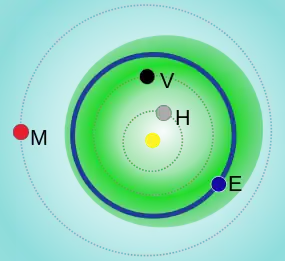| Discovery[1] | |
|---|---|
| Discovered by | Mount Lemmon Survey |
| Discovery site | Summerhaven, Arizona, US |
| Discovery date | 11 July 2005 |
| Designations | |
| 2005 NB56 | |
| Orbital characteristics[2] | |
| Epoch 14 July 2005 (JD 2453565.5) | |
| Uncertainty parameter 7 | |
| Observation arc | 17[1] d |
| Aphelion | 2.41707 AU (361.589 Gm) |
| Perihelion | 0.86585 AU (129.529 Gm) |
| 1.64146 AU (245.559 Gm) | |
| Eccentricity | 0.47251 |
| 2.10 yr (768.15 d) | |
| 25.175° | |
| 0° 28m 7.176s /day | |
| Inclination | 6.7563° |
| 112.359° | |
| 114.15° | |
| Earth MOID | 0.0163799 AU (2,450,400 km) |
| Jupiter MOID | 2.5887 AU (387.26 Gm) |
| Physical characteristics | |
Mean diameter | ~170 m[3] |
| 22.9[2] | |
2005 NB56, also written as 2005 NB56, is a near-Earth asteroid of the Apollo group.[2] In 2009, research physicist Edward Drobyshevski and colleagues have suggested that 2005 NB56 could be a possible source of the meteoroid that caused the Tunguska event on 30 June 1908. It has been also suspected to be a dormant comet.[4]
Possible source of the Tunguska event bolide
One study "suggests that a chunk of a comet caused the 5-10 megaton fireball, bouncing off the atmosphere and back into orbit around the sun."[4]
This object made a close approach to Earth when it was discovered in 2005 and will do so again in 2045.[5] This object has a poorly known orbit and was only observed over an observation arc of 17 days, not sufficient to predict its position in 1908 with sufficient accuracy.[2]
References
- 1 2 "2005 NB56". Minor Planet Center. Retrieved 9 August 2017.
- 1 2 3 4 "(2005 NB56)". JPL Small-Body Database. Jet Propulsion Laboratory. SPK-ID: 3283898. Retrieved 9 August 2017.
- ↑ Drobyshevski, E. M.; Galushina, T. Yu; Drobyshevski, M. E. (March 2009). "A search for a present-day candidate for the Comet P/Tunguska-1908". arXiv:0903.3313 [astro-ph.EP].
- 1 2 When Comets Attack: Solving the Mystery of the Biggest Natural Explosion in Modern History, By Mark Anderson, Popular Mechanics
- ↑ "NEODyS: 2005NB56". Department of Mathematics, University of Pisa, ITALY. Retrieved 19 May 2009.
External links
- 2005 NB56 at the JPL Small-Body Database
This article is issued from Wikipedia. The text is licensed under Creative Commons - Attribution - Sharealike. Additional terms may apply for the media files.
